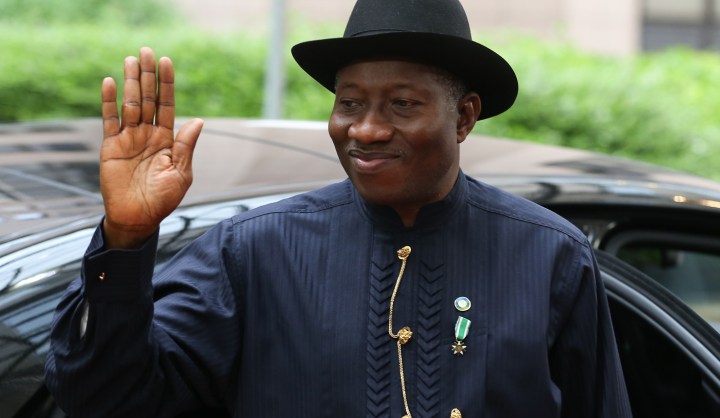Africa
Analysis: The Goodluck Jonathan Show must go on

Most politicians, in most countries, would have cancelled campaigning after the devastating suicide bombing at a school in north-eastern Nigeria on Monday. Not Goodluck Jonathan. With barely a mention of Nigeria’s deteriorating security situation, Jonathan launched his re-election campaign on Tuesday. He can afford to be tone deaf – with the opposition in chaos, this election is his to lose. By SIMON ALLISON.
On Tuesday, at a huge rally in Abuja, Nigerian President Goodluck Jonathan formally declared his intention to run in next year’s elections.
“After seeking the face of God, in quiet reflection with my family and having listened to the call of our people nationwide to run, I, Goodluck Ebele Azikiwe Jonathan, have accepted to re-present myself, on the platform of The Peoples’ Democratic Party, for re-election as the President of the Federal Republic of Nigeria, in the 2015 general elections,” he said to a huge, cheering crowd, his trademark black fedora hat detracting only slightly from the gravitas of his words.
His timing could not have been worse.
Just the day before, Nigerians were shocked – and, these days, they are not a population that shocks easily – when a suicide bomber blew himself up in a school in Yobe State, killing at least 46 schoolchildren. The scale and sheer brazenness of the attack, the gratuitous violence, and the undoubted innocence of the young victims made this attack particularly difficult for the nation to come to terms with.
In most countries, this would prompt a time of national mourning. Leaders would cancel frivolous public appearances, and political campaigning would be put on hold at least until the bodies were buried.
But this is Nigeria, and the Goodluck Jonathan Show must go on. After all, if the President were to cancel campaign stops after every gruesome incident, he wouldn’t be able to campaign at all. And so the capital was put on lockdown, causing traffic jams all around the city, and the iconic Eagle Square was prepped for a celebration: festooned with the green and red colours of Jonathan’s People’s Democratic Party, which has ruled Nigeria’s Fourth Republic since its inception in 1999, and ringed with stern security operatives.
In fairness, Jonathan did not completely ignore the school bombing. “Clearly, this has cast a dark cloud on our nation but we will surely win the war against terror,” he said at the beginning of his speech, just before calling for a minute of silence to commemorate them. “A number of young men and women have been kidnapped by these criminal elements, including our daughters from Chibok. We will free our daughters and defeat terrorism.”
But nor did he give the Nigeria’s ever-worsening security situation nearly enough attention. In a speech that ran to 112 paragraphs, the quote above is just about the only allusion he makes to Boko Haram. Listening to Nigeria’s President, one would never guess that his country is in the midst of perhaps the greatest national crisis since the doomed secession of Biafra; that Boko Haram have launched a de facto civil war against the central government, and now occupy serious chunks of Nigerian territory; and that the Islamist group appear able to launch brutal attacks against Nigerian civilians at will.
Instead, Jonathan focused on what he considers to be more important issues, such improvements to Nigeria’s highway system, a resuscitated railway line and increased access to water and electricity.
“Do you want to go back to the old ways?” he asked his audience, repeatedly, referring to the days of endemic corruption, bureaucratic bloating and a stagnating economy that his administration has supposedly replaced. “We cannot,” he answered, and he is absolutely right – although it’s far from certain that Jonathan’s administration has really put those old ways behind it.
Jonathan’s relentlessly positive spin – reminiscent of the ANC’s ‘A good story to tell’ campaign in the run-up to South Africa’s 2014 elections – may have energized his supporters, but statistics aren’t necessarily on his side.
Take the economy, for instance. Yes, it has ballooned in size to become the largest economy in Africa, but that’s only thanks to a long-delayed reworking of how Nigeria calculates its GDP – in other words, the numbers on the spreadsheet improved, not necessarily the economy itself. And when it comes to other development indicators, such as health, education and welfare, the Ibrahim Index of African Governance shows that Nigeria has made negligible progress in the last four years.
Still, Jonathan remains the clear favourite heading into the February 2015 poll. A new opposition coalition, which sounded so promising when it was formed in 2013, has struggled to sustain momentum, and is hamstrung by infighting over who will be the coalition’s presidential candidate. In the absence of an effective challenger, the PDP’s national base and slick electoral machinery should easily compensate for Jonathan’s weaknesses.
“God bless Nigeria,” concluded Jonathan on Tuesday. It was much a plea as a benediction – if Nigerians are going to survive another five years of his administration, and they’re going to need all the help they can get. DM
Photo: Nigeria’s President Goodluck Ebele Jonathan arrives at the fourth EU-Africa Summit of Heads of States at the European council headquarters in Brussels, Belgium, 02 April 2014. EPA/JULIEN WARNAND.
















 Become an Insider
Become an Insider